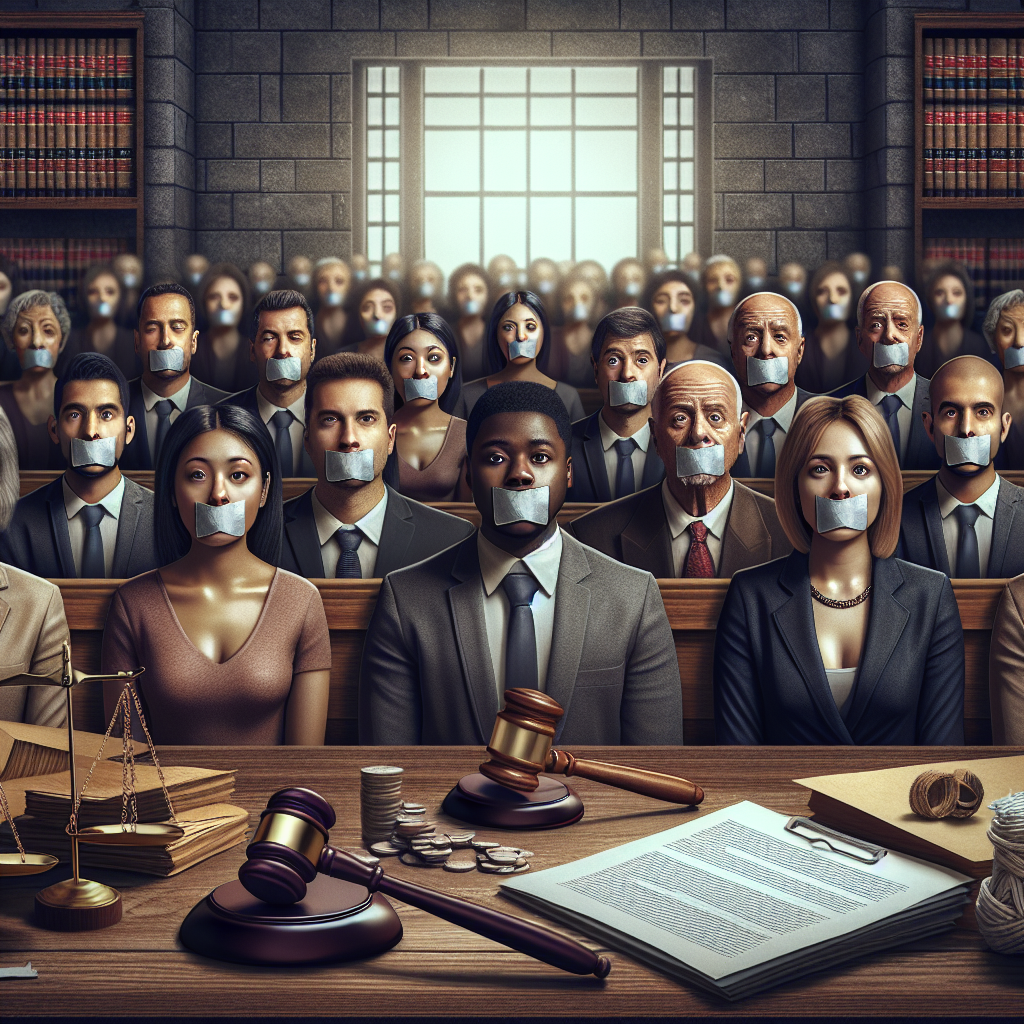
Introduction
In a world marked by the pursuit of justice, the heartbreaking reality of wrongful convictions often goes unnoticed. Amid the clamor for truth, countless innocent lives are ensnared in the tragic web of false confessions, meticulously crafted by coercive interrogation tactics. Voices Unheard: Stories of Innocence and the Trap of False Confessions brings these dark realities from the shadows into the light, exploring the devastating consequences that befall both individuals and communities when justice fails.
False confessions wield tremendous power—more than mere misstatements, they often represent a profound breakdown in our legal system. The implications resonate beyond the courtroom, preventing real criminals from facing justice, while innocent individuals endure unimaginable hardships. This article delves deep into the narratives of the unheard, providing insight into their harrowing experiences, and illuminating the systemic flaws that facilitate such miscarriages of justice.
The Psychology Behind False Confessions
Understanding Coercion
At the heart of Voices Unheard: Stories of Innocence and the Trap of False Confessions lies the disturbing psychology behind why innocent people confess to crimes they did not commit. Coercive interrogation techniques, such as isolation, manipulation, and the withholding of legal representation, create an environment where vulnerable individuals might confess—a devastating choice made under extreme pressure.
Table 1: Common Interrogation Techniques and Their Effects
| Interrogation Technique | Effect on the Innocent |
|---|---|
| Isolation | Heightened anxiety and desperation |
| Deceptive tactics | Confusion and fear of repercussions |
| Promised leniency | Diminished perception of guilt |
| Sleep deprivation | Impaired cognitive function |
Case Study: The Central Park Five
The notorious case of the Central Park Five exemplifies the doomed intersection of youth, race, and coercive interrogation. In 1989, five teenage boys were wrongfully convicted of assaulting and raping a jogger in Central Park. Their confessions, extracted through manipulative tactics, became the cornerstone of a flawed prosecution.
Analysis of the Case
The Central Park Five spent years behind bars, only to be exonerated two decades later after the actual perpetrator confessed. This tragic case brings to light issues of systemic bias, the fragility of justice, and how coerced confessions can ruin lives—even when the truth eventually prevails.
The Role of Media and Societal Perceptions
Media Influence on Public Opinion
Media coverage often shapes public perceptions of guilt and innocence, significantly impacting jury opinions. In the context of Voices Unheard: Stories of Innocence and the Trap of False Confessions, this bias further exacerbates the downfall of justice.
Table 2: Media Framing of High-Profile Cases
| Case | Initial Media Framing | Long-term Impact |
|---|---|---|
| Steven Avery (Making a Murderer) | Guilty before trial | Ongoing public debate on justice |
| Amanda Knox | Perceived as a villain | Lasting stigma and mistrust |
Case Study: Amanda Knox
The Amanda Knox case serves as a profound reminder of the media’s ability to frame narratives that can unjustly vilify individuals. Knox, an American student wrongfully accused of murder, faced vile public scrutiny based on sensationalized media portrayals.
Analysis of the Impact
Knox’s extensive media exposure cultivated a narrative that overshadowed the evidence, demonstrating how society often fails to reserve judgment. Her case embodies how false confessions and biased media framing can lead to the wrongful conviction of the innocent.
Structural Flaws in the Justice System
Lack of Legal Representation
One of the most egregious flaws within our justice system is the lack of adequate legal representation during critical interrogations. Many innocent individuals face police questioning without a lawyer, leaving them vulnerable to manipulation.
Case Study: The Case of Brendan Dassey
Brendan Dassey, a minor at the time of his interrogation for the murder of Teresa Halbach, did not have legal counsel present when he confessed. His subsequent conviction, based largely on this confession, highlights the consequences of inadequate legal protections.
Analysis of Systemic Shortcomings
Dassey’s plight underscores the urgent necessity for legal reform that ensures access to counsel before questioning. The absence of representation puts individuals at increased risk of false confessions, perpetuating the cycle of injustice.
The Emotional Toll of False Confessions
Psychological Impact on Individuals
The fallout from false confessions extends beyond courtroom drama; the psychological distress faced by wrongfully convicted individuals often perpetuates a cycle of trauma. Emotional scars can lead to long-term mental health issues, including PTSD, anxiety, and depression.
Table 3: Reported Mental Health Issues Among Wrongfully Convicted
| Mental Health Issue | Percentage of Affected Individuals |
|---|---|
| PTSD | 60% |
| Severe Anxiety | 75% |
| Major Depression | 50% |
Case Study: The plight of exonerees
Once freed from incarceration, many exonerees find it remarkably difficult to reintegrate into society. They grapple with their identities as both victims of the system and citizens seeking normal lives.
Analysis of Reintegration Challenges
This case highlights the necessity for systemic support to assist wrongfully convicted individuals in reclaiming their lives—a vital step in healing the wounds inflicted by false confessions.
Addressing the Issue: Legal and Social Reforms
Policy Changes
Advocating for unraveling the roots of false confessions involves implementing specific legal reforms aimed at safeguarding the rights of suspects during interrogation. Recording all interrogation sessions, alongside mandatory legal representation, are crucial steps.
Community Education and Awareness
Equally important is educating the community about the realities of Voices Unheard: Stories of Innocence and the Trap of False Confessions. Awareness campaigns can empower individuals to think critically and engage effectively in discussions surrounding justice reform.
Conclusion
Voices Unheard: Stories of Innocence and the Trap of False Confessions illuminates a significant, often overlooked, issue within our criminal justice system. As we uncover the harrowing narratives of wrongfully convicted individuals, it becomes essential to address the systemic flaws that lead to these injustices.
The journey toward reform is a collective effort that requires the determination of not only policymakers but every individual. Advocacy, education, and policy reform can foster a more just legal landscape, where the voices of the innocent are no longer unheard, and false confessions cease to be a weapon for injustice.
FAQs
What are false confessions?
False confessions occur when an innocent individual admits to a crime they didn’t commit, often due to intense psychological coercion during interrogations.What influences a person to confess falsely?
Factors such as manipulation by law enforcement, fear of harsher penalties, and extreme emotional distress play significant roles in leading individuals to make false confessions.How common are false confessions in wrongful convictions?
Studies indicate that false confessions contribute to about 25% of wrongful convictions, illuminating a critical issue within the justice system.What can be done to minimize false confessions?
Implementing mandatory legal representation, recording all interrogations, and educating both law enforcement and the public can help reduce the incidence of false confessions.- How can society assist those wrongfully convicted?
Society can support exonerees through advocacy for legal reforms, providing mental health resources, and raising awareness about the systemic flaws that contribute to wrongful convictions.
This extensive exploration of Voices Unheard: Stories of Innocence and the Trap of False Confessions serves as both a call to action and a testament to the resilience of the human spirit in the face of injustice. Let’s unite in our efforts to ensure that every voice is heard, and every story is validated. The road ahead is long, but together, we can make a profound difference in the lives of the innocent.















